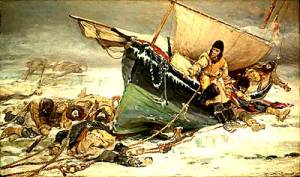 It was reported today that one of the ships from Sir John Franklin’s long-lost Arctic expedition has been found. If you don’t live in Canada, maybe you don’t appreciate just how significant this discovery is. In British terms, this is roughly equivalent to the bones of Richard III being found under a parking lot.
It was reported today that one of the ships from Sir John Franklin’s long-lost Arctic expedition has been found. If you don’t live in Canada, maybe you don’t appreciate just how significant this discovery is. In British terms, this is roughly equivalent to the bones of Richard III being found under a parking lot.
Some have described Franklin’s expedition as the nineteenth-century equivalent of an Apollo moon mission. The British Admiralty knew that any shortcut to the Orient through the frozen channels of the Arctic would be too treacherous to have commercial value. It invested in Franklin’s attempt to find the Northwest Passage for the sake of national pride. Britain wanted to demonstrate its scientific superiority to the world just as twentieth-century America did when it planted its flag on the lunar surface.
It’s easy to cast Franklin in an unfavourable light. Like other classic British explorers, he was glorious in his failure. On a previous overland Arctic expedition, he’d run short of provisions and acquired the moniker, “the man who ate his boots.” Instead of learning from the local Inuit on his next journey, he’d relied on inaccurate Royal Navy charts and suffered the fatal consequences. You might say that he was an epic example of a man refusing to stop and ask a local for directions. Of course, it’s easy to deride him from the comfort of our armchairs with hindsight on our side.
Like many Canadians, I grew up hearing about Franklin’s doomed expedition through history, folklore and song. It’s part of our national mythology, shrouded in the mystique of the North, an unimaginably vast region of our country that very few of us have travelled to. Perhaps it’s no big surprise then that I incorporated the tale into my own writing. What might be less obvious is why I chose to make it part of a modern-day novel, titled After Helen, about a history teacher who’s recently lost his wife to cancer.
There’s a great deal that’s compelling about Franklin’s story. It’s a mystery. It’s a lesson in hubris. But what fascinated me the most is the role that Sir John’s wife, Lady Jane, played in it all. This is the facet of the tale that also absorbs Irving, my novel’s protagonist.
As a history teacher and Franklin aficionado, Irving can tell you that when years passed without a word from the expedition, Lady Jane shamed the British Admiralty, the emperor of Russia and the president of the United States into mounting what some say was the largest search-and-rescue operation to this day. When searchers uncovered evidence of cannibalism among the crew, Lady Jane enlisted the support of none other than Charles Dickens to discredit them. In the end, she subverted history so that Sir John was unjustifiably praised as the hero who’d discovered the Northwest Passage.
The fact that Lady Jane strongly encouraged Sir John to lead the expedition in the first place – despite his questionable suitability for the mission – makes this a compelling case study in grief, a grief that Irving is all too familiar with. His desire to remember his wayward wife, Helen, as a better version of herself that never truly existed parallels Lady Jane’s need to trumpet her late husband as a national hero. In the end, he realizes he must choose between maintaining this self-deception and salvaging his relationship with his teenaged daughter. This is a choice that Lady Jane never seemed to have confronted herself.
As further investigations of the recently discovered shipwreck tell us more about the fate of Franklin and his men, I’ll be particularly interested to see what they further reveal to us about the human capacity for self-deception and the challenges we face to move beyond it.
Paul Cavanagh is a critically-acclaimed, award-winning Canadian novelist. A free sample of his first novel, After Helen, can be found at www.afterhelen.com.
